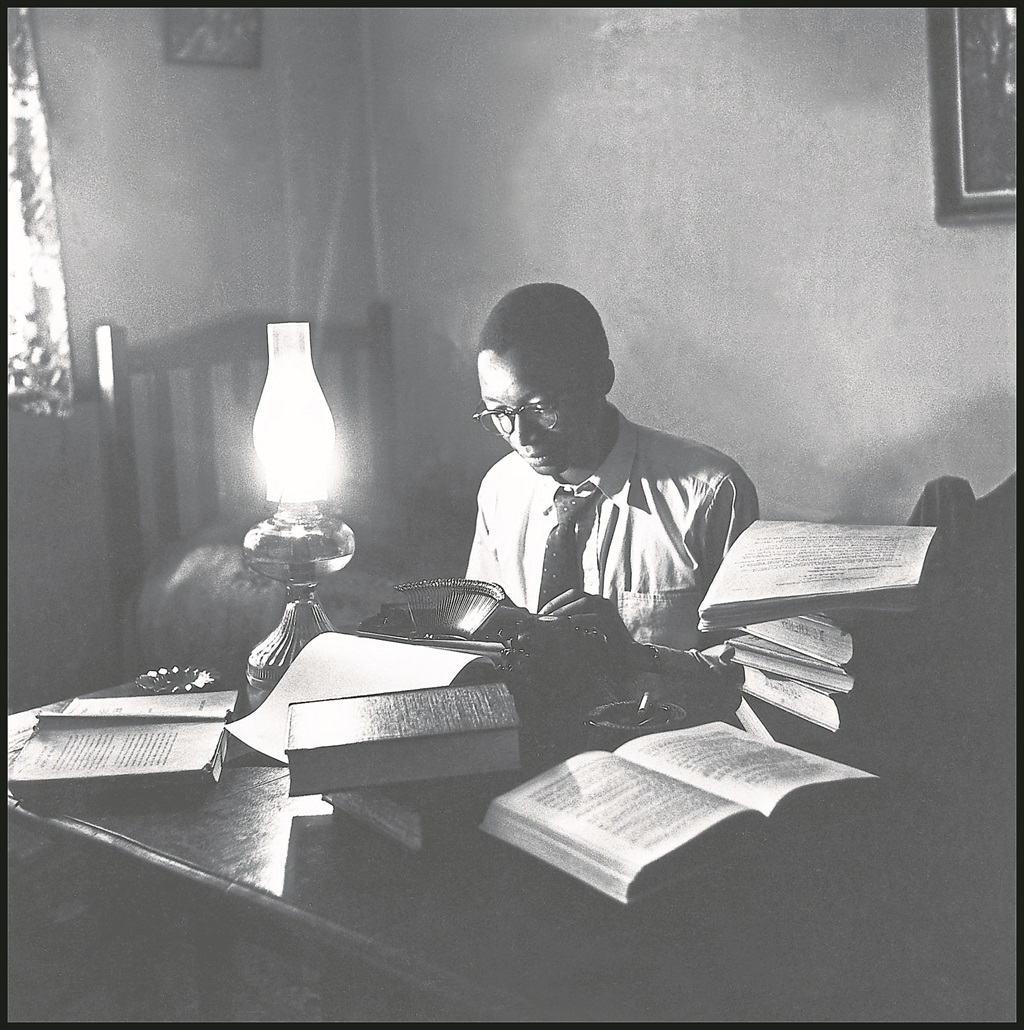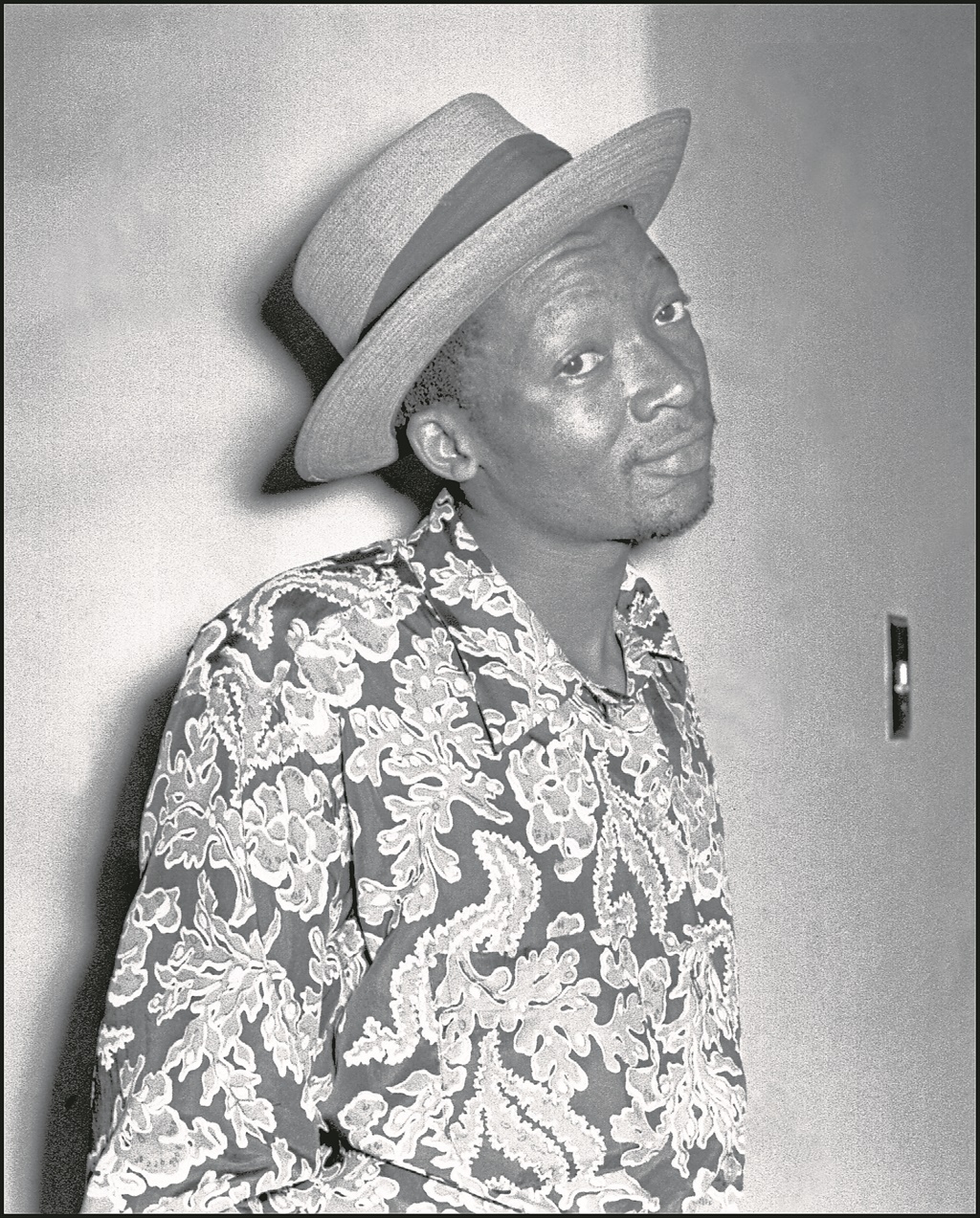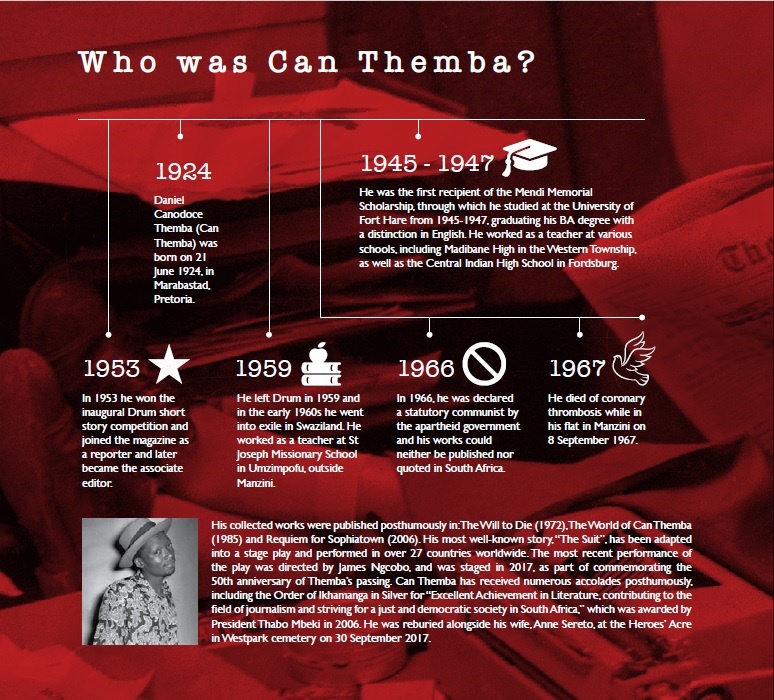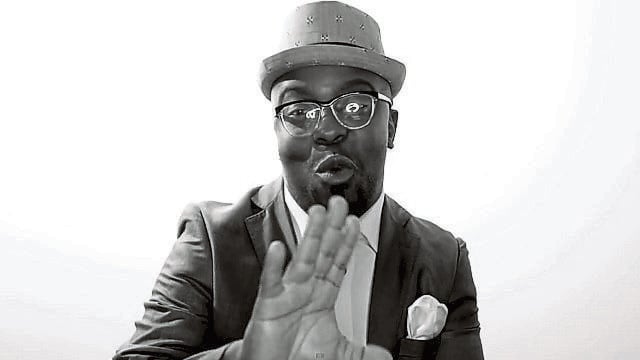In a way, Siphiwo Mahala’s career was made possible because of the Can Thembas of this world.
“I thought I knew about him, but I really didn’t. As a literary historian, I wanted to track the process of him becoming who he was,” says the novelist, short story writer, playwright, academic and now film maker, when we meet for coffee and a long chat about the monumental impact Themba had on the industry during his lifetime.
For the past few years, Mahala has taken up residence in Themba’s world as he worked on his breakout play The House of Truth and his PhD, both of which are based on the life and work of Themba.
The PhD led to Mahala’s documentary The Teacher in the Newsroom, the first in-depth film on Themba, which will premiere at a one-day event next week called the Can Themba Symposium.
The literary star
“I worked with Bra Willie [poet laureate Keorapetse Kgositsile], who used to work with Can and he would tell me stories about him. I also interviewed others who were close to him,” says Mahala.
The list reads like a who’s who of South Africa – his wife Anne Themba, struggle icon Ahmed Kathrada, journalist Juby Mayet, academic and author Njabulo Ndebele, and literary greats Nadine Gordimer and Don Mattera all get a look-in.
Mahala had conducted a good few interviews by the time the PhD bug bit. In 2013, after the Can Themba Memorial Lecture, which marked the 50th anniversary of the publication of Themba’s short story The Suit, Mahala’s professor pushed him to do a PhD, that would consume four years of his life.
“As I was recording all these prominent individuals, I realised I was sitting on a gem. I wrote the play as a way of coping, a distraction outside academia, as I am a creative person first.
“It was staged at the National Arts Festival in Grahamstown in 2016, then at the Soweto Theatre and The Market ... and then I started thinking about a documentary.”
Mahala graduated last year and has since been focusing on the documentary, which took five years to make.
“I knew I had interviews that couldn’t be repeated as quite a number of the people had since passed on. I roped in Mtutuzeli Matshoba, a writer who has changed lanes to work in film. I felt he could share the same perspective as me, and he came on board with a crew and we began the work.”
The reserved intellectual wearing a striped golf shirt says he tried to tell Themba’s story with creative integrity.
“You have the interviews ... I mean, I spoke with Mangosuthu Buthelezi, who went to the University of Fort Hare with Can, along with people like Robert Sobukwe and even Robert Mugabe,” says Mahala.
He also travelled to Swaziland as the exile chapter of Themba’s life hasn’t really been told, and he spoke to people who worked with Themba there.
“This was all just talking heads, so I fused this with parts of the play.”
Scenes from The House of Truth serve as historical re-enactments in the film.
The Drum boys
As he talks, choosing his words with characteristic care, Mahala takes us back to the days of Themba and his risqué clique of journalists who would create a new language in journalism, one as rich as it was casual, as poetic as it was forthright; entrancing readers with the immersive power of their pens to describe the pain and joy of urban black life during apartheid.
Themba entered a short story competition at Drum magazine, which he ended up winning, says Mahala. This led to a job and his writing talents became central to Drum’s newsroom, where he left an indelible mark on the history of our media. He did so with a few like-minded writers, among them Henry “Mr Drum” Nxumalo, Todd Matshikiza, Nat Nakasa, Lewis Nkosi, William “Bloke” Modisane, Arthur Maimane, Stan Motjuwadi and Casey Motsisi, who approached their work with a live fast, die young and be a good-looking corpse ethic. No assignment was too outrageous or too dangerous, and they would land themselves in some very tricky situations. Themba once wrote about his experience one Sunday of going from one white church to another, detailing how the good Christians treated him.
“The laws were against them in almost every way and they were daring to oppose this. One of the issues Can tackled was the Immorality Act,” Mahala says.
At the time, Sophiatown in Joburg was one of the only places in the country where black people could own land alongside white people.
“It was basically what South Africa would become, which the government of the time saw as a threat. They had to be rebellious because of those pressures.”
I ask Mahala about the most surprising thing he learnt about Themba during his research.
“A number of things come to mind. He was a great visionary concerned with nurturing young talent. He named his home The House of Truth and he opened it as a parliament of the people. He was passionate about debate and discussing ideas. This extended to the classroom and, of course, the newsroom.”
The teacher in the newsroom
Themba taught at several schools, including Madibane High School in Western Native Township, Central Indian High School in Fordsburg and St Joseph’s Missionary School in Swaziland. Among his students were Motsisi, Motjuwadi and Archbishop Emeritus Desmond Tutu. But Themba also did a lot of teaching on the newsroom floor.
“He was actually fired from Drum by editor Tom Hopkinson, but, despite this, Can would still be called in to consult on certain issues. He was very passionate about imparting knowledge. When he became the assistant editor of Drum, he brought in one of his students, Casey.”
Themba would actively help shape the craft of those around him. Even in his role at Drum as assistant editor, he was really the man at the helm of the publication, a fact uncovered as Mahala dug deeper.
“I had the good fortune of interviewing his wife, who has subsequently passed away. We had such an insightful conversation. I even traced the man back to his early days – a boy who was born in Marabastad in Pretoria and ultimately passed English with a distinction at the University of Fort Hare. This was crucial as I had to find out where his passion for reading came from.”
Mahala says Themba first became smitten with the written word in his days at Kagiso Secondary School in Krugersdorp. Mahala managed to access some of his stories and poems from when Themba was still a student.
“Those haven’t been published anywhere. We also know that Themba didn’t mind a few drinks, so much so that they attribute the culture of drinking at Drum to him. However, when he started out, he wasn’t much of a drinker.”
Mahala also spoke with legendary photographer Jürgen Schadeberg, who took the first picture of Themba that appeared in Drum.
“He took the picture in 1952 when Themba won the short story competition. That competition had entries from across the continent. I mean, the runner-up was [Nigerian author] Cyprian Ekwensi.”
After he was recruited to Drum, Schadeberg said that Themba was almost a misfit because he was so prim and proper. Jim Bailey, the proprietor of Drum, felt the only way to get at the true character of a person was to give them a drink, and a tradition known as the Cardinal Puff, a quick way for one person to get a large group of people thoroughly intoxicated, began.
Professor Muxe Nkondo is delivering the keynote speech at the symposium next week. He was also mentored by Themba.
“Tall, but not imposing, apparently casual in his disposition, with an uncanny grip on English words, which he used to capture the complexities and the ironies of township life,” is how Nkondo describes his mentor.
While highlighting Themba’s extraordinary ability to interpret a classical poem, Nkondo also stresses the less highbrow side of Themba: “Attentiveness to the experiences, particularly of the poor and the marginalised, and the responsibility to communicate and share one’s listenings.”
The youth can too
Afrosoul singer Kabomo will perform at the symposium for free. His sound is a good fit for this occasion as the man has that old school essence in his style. The young and soulful crooner might be one of the youngest people on the roster at this event, and will share the bill with the likes of veterans Sipho “Hotstix” Mabuse and Sello Maake Ka-Ncube.
Kabomo explains what drew him to the event: “I feel both Siphiwo and Can Themba are people to be respected for their art and contributions. I saw Siphiwo’s play and the research he put in. It is great to have our stories being told. [Themba] created amazing work in a situation that wasn’t as easy to create as it is today.”
This fascinates him as a writer.
Kabomo particularly admires Themba’s character work, “how he was able to find real characters, and the honesty and pain and even humour in his work. I always wonder where these people found the energy to make people laugh in such times. For the audiences, it is easy to laugh, but where do you find that energy as a writer?”
When asked about the set he intends to do at the show, he says: “I haven’t sorted my set yet. These days, artists get booked for a gig and they have a set prepared, they rock up, do 20 minutes and then that’s it. I would like for this to be more than just that. I want to include all the things I do – poetry, acting, spoken word. A show like this can allow for a return to infancy, where you can really dig deep.”
The socially aware singer is a friend of the producer of The Teacher in the Newsroom, and he says that Mahala is sure to deliver something remarkable.
“From what I could tell, it is a labour of love. Film is an expensive art form and he spent lots of his own money on this. Siphiwo is my friend and I know him as being very detailed and hardworking, so I expect that to show in the documentary.”
The symposium on Thursday will include a screening of the documentary, as well as a panel discussion. There are surely few greater things than being honoured by those you have taught, and it is a shame Themba perhaps didn’t receive these kinds of acknowledgements for his contributions while he was still with us. But, fortunately, people like Mahala are around to ensure that this legacy is preserved.
Let’s hope the documentary makes it to our screens and classrooms. As Nkondo says: “Can Themba should be required reading in our schools and universities. And more productions of Siphiwo Mahala’s work on Can Themba, please.”




 Publications
Publications
 Partners
Partners












